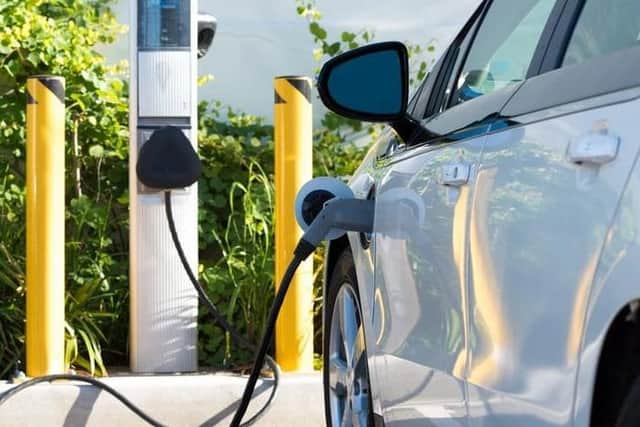Should Lancashire bosses charge their workers' electric cars?
and live on Freeview channel 276
Electricity North West (ENW), the company responsible for the region’s distribution network, says it will be asking firms in a position to do so to follow its lead and install ordinary plug points at their premises which would supply enough charge to power their workers' daily commutes.
The details emerged at a meeting of Lancashire County Council’s external scrutiny committee in the week that a ban on the sale of new petrol and diesel vehicles in the UK was brought forward to 2030.
Advertisement
Hide AdAdvertisement
Hide AdCommittee member Peter Steen said Lancashire residents wanted to know how they were going to charge electric cars when many of them lived in terrace streets “where a large number of them cannot even park outside their own properties”.


ENW’s engineering and technical director Steve Cox said that home charging was “by no means an essential part of [owning] an electric vehicle”.
“People worry that their battery will run dry, [but] in reality, most people - most of the time - do short distances. So the way to solve the problem is to have lots of chargers at destinations - supermarkets, car parks and places where people work.
“You can recharge your vehicle at roughly ten miles per hour on just a normal 13-amp plug.
Advertisement
Hide AdAdvertisement
Hide Ad“As an employer, we have put lots of 13-amp plugs in our car park and...as an incentive, we‘re not charging for that electricity - it costs roughly 4p a mile and [would cost] more to meter it than it does to provide it...for free.
“We will be encouraging lots of employers in the region as part of our outreach [work] to provide slow, low-cost trickle charging for their employees,” said Mr. Cox.
The meeting also heard that petrol stations and supermarkets are investing in faster charging points for their customers.
However, Preston county councillor Carl Crompton called for organisations such as local authorities, companies and ENW itself to lead by example and convert their vehicle fleets to electric now.
Advertisement
Hide AdAdvertisement
Hide Ad“We should say [to people], ‘This is what we’re doing to protect our environment for future years - and we want you to do it as well’,” County Cllr Crompton said.
Members heard that while domestic vehicles will be electrified, there will be a role for hydrogen and biomethane in powering HGVs.
Comment Guidelines
National World encourages reader discussion on our stories. User feedback, insights and back-and-forth exchanges add a rich layer of context to reporting. Please review our Community Guidelines before commenting.